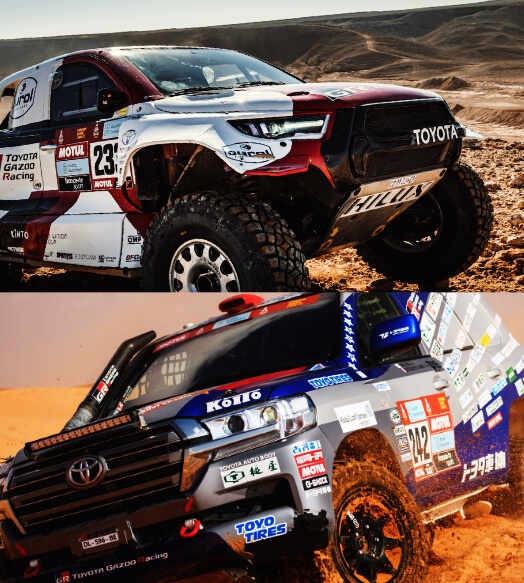ABOUT DAKAR RALLY
Dakar Rally
The doorway to adventure was opened when young French motorcycle racer Thierry Sabine came up with the idea for the rally in December 1978. The rally started in Paris and crossed over the Sahara Desert towards the goal in Dakar, the capital of Senegal in the African continent. Because of the route, the rally was named the Paris-Dakar Rally and became widely popular. Then, the rally was moved to South America from 2009-2019 due to political unrest. In 2020, the adventure moved once again to a new location, this time to Saudi Arabia in the Middle East. While the location has departed the original Paris and Dakar cities, the name Dakar continues to be used to this day.
The Dakar Rally sees participants competing in deserts, muddy and mountainous terrain – a diverse range of road surfaces. Even among other cross-country rallies and rally raids, it is well-known as being the world’s toughest and harshest event. On some stages, participants and their cars must travel over 800km in a day in the hottest and most unforgiving conditions. During the rally, which spans a period of about two weeks, not only must the drivers possess the right driving technique, but they also need to have the mental and physical tenacity, as well as the knowledge required to deal with mechanical issues during the competition, and their navigation skills and experience are tested to the limits.
The Dakar Rally is so tough, that people are said to be winners even if they are just able to reach the finish line, since only about 50% of participants can reach the goal. And together with the name of the rally comes the pride of “The toughest rally in the world” and “The spirit of never-ending adventure” – the rally continues to captivate a large audience.

TOYOTA's HISTORY
IN THE RACE
Toyota vehicles have been chosen since the inaugural Dakar Rally in 1979 by many participants, and in that year 13 of the 74 vehicles that completed the rally were Toyota vehicles. Since then, while continuing to compete in and be a valuable part of the Dakar Rally, Toyota has always proven its high quality, durability and reliability. Especially in the T2 category (production car category) where the permitted modifications are strictly limited in order to maintain the vehicles’ specifications as closely as possible to the production model, cars must still meet the demands of entrants. For this reason, Toyota vehicles have always been highly sought-after by private teams participating in the Dakar Rally.
In addition, TOYOTA GAZOO Racing South Africa (TGRSA), an active local team who debuted in the T1 class (super production) in 2012 with the Toyota Hilux, have since achieved a place in the overall top 10 every year, and continuing in 2022 with the new structure as the TOYOTA GAZOO Racing works team, won their second overall victory since the 2019 rally.
TOYOTA AUTO BODY CO.,LTD., who produce the Land Cruiser, have been competing in the rally since their debut in 1995 for more than 25 years in the T2 category (production car category) as Team Land Cruiser TOYOTA AUTO BODY (TLC). The T2 category requires cars to be as close as possible to production specifications, and only permits changes that are required for safety reasons or changes that must be made in order to meet minimum rally specifications. The goal for TLC is to toughen the Land Cruiser in extreme environments to make it even tougher. TLC’s dedication gave them a one-two finish in both the 2021 and 2022 rallies, resulting in an unprecedented nine consecutive victories in the production car category.
